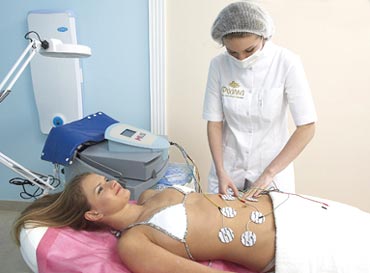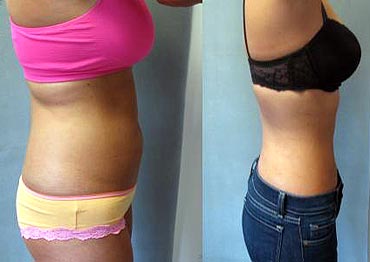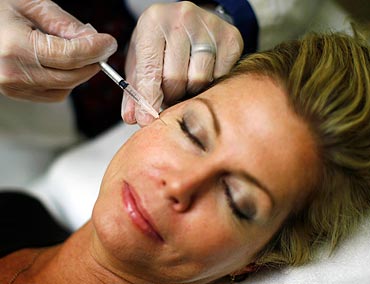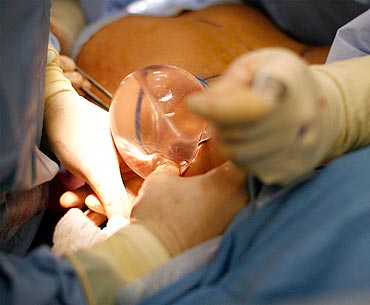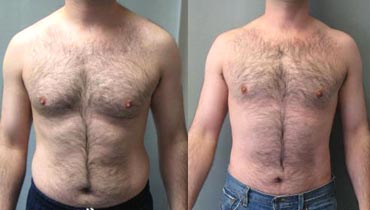 | « Back to article | Print this article |
'If a 17-year-old wants breast implants, I say NO'
Prominent cosmetic surgeon Dr Jaime Anger of Brazil paid a work-related visit to Mumbai last month. The good doctor, who serves on the Brazilian Federal Board of Medicine, the Brazilian Society of Plastic Surgery and is a Corresponding Member of the American Society of Aesthetic Plastic Surgery will complete three decades in the field this December.
Here, in an exclusive interview, Dr Anger tells us why India is now the fourth largest hub of cosmetic surgery in the world, ethical dilemmas experts in his line of work face and how youngsters' fast-paced lifestyles today are landing them on the operating table. Presenting edited excerpts:
Is this your first time to India?
Yes it is. I'm here to share new technology for liposuction with cosmetic and plastic surgeons. We've been doing it in Brazil for a long time, it's not so new for us. It's new to India though and it's changed a little bit in these last two years. It uses ultrasound to destroy the fat cells.

What is it about cosmetic surgery in India that intrigues you? What made you feel like yes, this is the time to bring this technology to our country?
I'm a known name in cosmetic surgery, both in Brazil and in the United States. I didn't really know much about cosmetic surgery in India but when I was in the US recently, a lot of people (Indian cosmetic surgeons) were keen that I visit here personally to teach this technique, to go to see patients together.
Will you be performing procedures here during your visit?
No, I'm here only to teach and observe for now, but in the future maybe, let's see.
According to a survey conducted last year, India is now the fourth-largest hub of cosmetic surgery in the world. Why do you think that is?
First thing, we are talking numbers. It's either relative or absolute numbers, so in the case of absolute numbers you're looking at a population of one billion, one hundred thousand, yes? It's so big, it's like China, China is the world's fastest growing hub of cosmetic surgery in the world today. More money, changes in social behaviour, it's the same everywhere, even in Brazil. It's not something that can be stopped.
Life is changing, particularly for women. Women work more than before; unfortunately, they have a lot of jobs to handle at the same time -- mother, wife, home maker...Today's woman is more concerned about her life and has certain expectations as a result. She has a position in society. And when she becomes old, it changes. I think aging for women, at this moment in the world, is worse than for men. There are new markers, new concepts of beauty and that's why they want plastic surgery.
'Of all my patients, maybe half a percent are men'
Do you think that the majority of women who opt for plastic surgery are rushing into it without weighing their decision carefully?
If they don't do it now they will do it later! In Brazil, we do a lot of plastic surgery, I think we are second in the world today but in some fields we are the first now -- that is mainly liposuction. It's a way of life, it's very difficult to discuss why women are changing so much.
I'm not talking about men, because I do maybe half a percent of procedures on men! Why? Because they don't become pregnant, they don't have breasts, they become older later and they have money. Money is important -- beauty may be important to the woman, but still, at least in Brazil, money is important to the man! (smiles) Such is society! I don't know how it is in India, is it the same way?
Yes! Since we're on the subject of money, how many times do you find that women tend to go to someone who's not fully qualified and ends up botching up the surgery?
Oh, this is a difficult question! There are ways to find out whether a doctor is a good doctor or not. Safety is an important subject and we've been discussing this lately both in Brazil and the United States, because I'm a member of the American Society of Aesthetic Plastic Surgery.
This is one of the worst points, because we cannot obligate the patients to choose a good doctor. Look, it's a market -- it's up to us to an extent, not beyond that. Today with the Internet you can look up where a doctor's office is, where he undertook his training programme, what his behaviour is like and so on but it's still not easy. I wouldn't want to be a patient because it's really difficult choosing a good doctor!
You have to study your surgeon's background -- if he is in touch with the foreign markets, the latest techniques everything. You may think, 'Oh, my friend did her surgery with this doctor and the result was very good,' but that doesn't mean you will be happy with your surgery.
So first you have to visit the doctor -- and never go by yourself, take your husband, or wife, or mother or sister...You always have to have one other person watching the consultation. Why? Because you're nervous -- patients are always nervous during their first consultation.
Come back twice to the doctor. Never decide to go ahead with the surgery the first time around. Go and see one other doctor as well -- unfortunately, that's not good for us (laughs) but it's good for the patient so take a second or even a third opinion. Think it all through beforehand.
Advertising is also a very bad thing. In my country, you cannot advertise -- the law doesn't permit you to. You can't even put photographs of your patients on the Internet! So my first consultation is one-and-a-half to two hours. I talk to them, I try to make my patients more comfortable even if he or she knows me. And I never see my patients alone. That's very important.
'You don't go to the surgeon like you're going to apply some cream!'
Lately, at least with the younger generations, it seems like there is a very popular misconception that going under the knife for cosmetic reasons is a minor procedure. What's your take on that?
It's not a minor procedure -- it's a surgery! I'm always repeating that. I don't treat 'clients', I treat patients. This is the medical field and cosmetic surgery is still surgery. I am a consultant in a hospital and I treat some very difficult patients. When I do a liposuction surgery, it's like a cardiac surgeon doing a heart transplant -- it's the same. The danger is the same, it's an operation!
You don't go to the surgeon like you're going to apply some cream! Patients usually push the doctors to share the same feeling, but I don't allow that. I say, " This is a surgery. Small, big, it doesn't make a difference."
Do you find that patients who come for surgeries are well-informed about what they're getting into -- that this is a full-blown operation, it's not like 'I want bigger breasts, so boom, I'll just go out and get them'?
No they're not. The patients don't come to surgery; they come to a beauty office! They want to hear that it's not a bid deal, that it's a simple thing but if as a doctor you have a conscience and you're honest, you will try to drive it into them and give them space to think about it. This is important. If they come to me thinking, 'I'll go there, it's an hour's surgery, no big deal, I'll go home after that' then that's not true.
I try to give them a reality check. I have to, I've been in the business for 30 years, so I see patients, and I've seen patient's daughters, even their granddaughters! It's my job and I want to keep my patients.
Does it happen often that a patient gets addicted to plastic surgery? First they want breast implants, then they want to remove cellulite around the thighs maybe, then after that they want their nose operated Do you see that pattern often, of the same person returning time and again for more procedures?
Now, yes. It wasn't like that before. I have a paper being published regarding this issue next month in Brazil and I also presented it in the United States recently.
If a patient who's already had cosmetic surgery before, say a nose surgery for instance, comes to me for liposuction I'm cautious. Because such patients move from doctor to doctor, surgeon to surgeon and that's not normal. In my office, of all the patients who visit me for surgery, 13 percent are under psychiatric treatment or visiting a psychologist for some form of therapy. And their reason for the surgery is, 'I'm depressed'. We see several cases of actual clinical depression in our (cosmetic surgery) offices. And this is not a normal patient, such a situation is not normal.
In such situations you need to recognise what the real problem is -- I'm not a psychiatrist. What we try to do then is give their doctors (psychiatrists) some insight into the situation so that they can be advised and maybe avoid surgery. Such patients are typical -- they won't be happy with the surgery, at least most of them won't be. These are not happy people and even if you perform a good surgery, they will complain. Because they are not happy with their lives -- plastic surgery is not the answer.
And we are seeing more of this type of patient every day. There are two published papers in the US out now, talking about 41 percent of cosmetic surgery patients as having psychological issues. These patients are not crazy of course, you are allowed to perform surgery on them, but sometimes not. Around the world, there are now more and more of them.
You have to pay attention to these issues, it's not like 'Oh, you want surgery? This is the cost, get it done and ciao! It's over'. Now, doctors are choosing their patients before electing to undertake surgery, this is the future in this field.
'Two weeks after I refused to do liposuction for a teenager, she was in the ICU'
What do you think should be the legal age for youngsters to undergo cosmetic surgery?
Let me ask you something. You're a lady -- say you're 15 years old and were born without one breast, what would you do? And on the other hand, say you're 17 and you're unhappy because you have small breasts, what would you do? So you see, each situation is different. In Brazil we are allowed to perform breast surgery on a 17-year-old, but I don't ever do that under normal circumstances. It depends from patient to patient. But if you're 15, you weigh 55 kilos and you've got four-kilo breasts already, yes, you have to get a reduction and I would do it.
As for liposuction, I never do it before 19 -- never. The behaviour of young girls is becoming very difficult. In Brazil, they come in for really small things. 'I have a small belly, I want to get rid of it.' I don't do that!
Nose surgery, you can do after 15 -- in Brazil -- but not in the United States. It all depends upon the legal situation of the country. In my country, you can get it done with parental consent after 15.
So when you're talking about age, it really depends upon the situation -- there are no rules. The only rule is for liposuction -- not before 19.
But there are so many young girls out there who, before they're fully-grown are so anxious to look good, that they elect for surgery. They see celebrities and Hollywood stars and they want to look like that, so they choose to go under the knife even though they look perfectly beautiful the way they are
That's just what I'm talking about -- it's up to the doctor and I would not do the surgery. I discuss this with my wife all the time, she's a psychologist and she has been working with me for a number of years, although she's retired now.
If somebody comes with a picture, a Hollywood or Bollywood (smiles) picture, I don't do the surgery. If I see you taking out a picture, it's 'bye-bye'! That's the worst kind of patient!
But then if you don't do it, they'll go to someone else who will
Yes, somebody else will do it, but that's not my problem. I do advise them, I tell them 'you're going the wrong way'. But they don't hear me out. In my experience, of every 10 or 20 patients I refuse, 90 percent will elect for surgery elsewhere anyway.
I have a good story to share with you. I work in a very big hospital in Brazil and there is a bank operating inside of it. So the manager of the bank once came to me with his daughter -- they both know me very well. She was 19 years old at the time, 168 cms (about 5'5") tall and she weighed 79 kilos -- fat. She'd gotten pregnant at 16 and then her boyfriend left her. Her child was now over two years old and she was living with her mother. She wanted a tummy tuck, to undergo liposuction.
And I know her, I see her twice a week. So I said, 'No way -- go exercise, change your lifestyle.' 'But then how can I compete with my friends?' she asked me. 'I'm 19 but my body looks so much older.' 'I'm not guilty of that,' I told her, 'you are! You have to improve your way of life.'
She ran away from my office in less than an hour, she got very nervous around me. But then she went to her grandmother, her grandmother gave her the money and she went to another doctor and got a tummy tuck done. Who does that -- a tummy tuck at 19?
Two weeks after the consultation with me, the bank manager came to me -- she was in another hospital, in the ICU. She had gotten necrosis -- it's a huge complication, it's like a large hole that forms in the area of the body where the operation is performed. I treated her for two months after that, to try and undo the damage, try and erase the scars, but the appearance of her abdomen now (trails off).
So this is an example of what happens when you're not old enough to know what you're doing. Such cases are horrible -- I know what I have to do, I have integrity. You advise patients to go to the gym, lose weight, change their lives, sometimes I send them to psychologists. This is how you have to work in this field, you're a doctor, after all.
'Beauty today is so important -- I'm not saying that's good, but it's the truth'
So who would you say is a suitable candidate for cosmetic surgery?
I think that would be patients who suffer from Lipodystrophy -- they have abnormal levels of fat in the wrong part of the body that isn't normal. Two, three, maybe four kilos extra. I know many doctors perform liposuction for big (obese) patients -- it's not a common practice in Brazil, but it is in the US, UK and even here in India and it's very dangerous. I do it sometimes in special situations but most of my patients are those who suffer from Lipodystrophy.
You know, in the last five years I haven't done any surgical reviews. Because I choose my patients so carefully, I only take those who are serious about turning their lives around and they do -- they make changes to keep healthy.
Say you get a patient who's 31, divorced, wants to feel good about her life -- you take that patient. Because beauty today is so important -- from China to Brazil, all over the world. I'm not saying that's good, but it's the truth, it's reality. And so plastic surgery exists.
It's expensive, but then look at the situation. A woman could spend her money on so many other things, travel, have a better life, but she uses it to look beautiful. Even when it comes to cosmetics -- say a lipstick costs one dollar, for example. How many will a woman buy in her lifetime? The money that companies make from cosmetics and creams is unbelievable. So if you consider that same amount of money and spend it on surgery, that's once in a lifetime but they spend similar whopping amounts on beauty products all their lives.
Cosmetic surgery in India is considerably cheaper than elsewhere across the world. Can you provide some insight into why that is so?
Actually, cosmetic surgery costs less in many parts of Asia. While I know it is expensive in Japan and Singapore, it is much more affordable in countries like China and Malaysia. You see, in developing countries the technology and treatment is also cost-effective.
But remember, the best of surgeons will always be expensive. It's a big responsibility, undertaking surgery. Doctors like me spend time studying the latest techniques, travelling abroad, attending important meetings. I need to spend time learning, traveling -- it is an expensive specialty and it changes fast. So if you're using the latest technology it is always expensive.
And if nothing else, spend more to be safe. That's top priority. Go to a qualified doctor of repute.
'The older technique of liposuction was very damaging'
You're in India to share and teach surgeons here about ultrasonic-assisted liposuction. Can you tell us a little bit about this technique?
The use of ultrasound in the medical field is very old. In the '50s and '60s it was used by dentists -- that was the first step. Then, in the '70s it began being used for surgical purposes and for (medical) examination purposes.
The thing about ultrasound is, it depends upon how you use it. Examinations, for instance, are possible with small frequencies, but if you use a high frequency and high amplitude it's very aggressive and that's more surgical. It's the same technology but it's used differently for different purposes. It was first used surgically to remove intra-cerebral tumours. To remove even a benign tumour earlier, major surgery was involved -- you had to open things up, cut through the bone to get to it and it was a lengthy, difficult procedure. Ultrasound made it possible to make just a small hole in the skull and take out small tumours from inside the brain without a major operation.
In the '80s one plastic surgeon was watching a surgery like that, a neurosurgery and he thought, we can do the same thing -- make just a small hole and you can take out something, or destroy something very specific. When it comes to liposuction, the membrane of fat cells is very sensitive so even a small trauma destroys them. So he worked out a deal with an Italian company to come up with equipment that destroys only these fat cells using ultrasound.
In 1997 they came up with the first quality machine that only destroyed fat cells and it's been evolving since then. All you do is make a small hole, put in a probe of three to five millimetres and it destroys only fat cells. The frequency at which it operates, it can only destroy fat -- you don't harm veins, or arteries. And cosmetically, the main thing is that it doesn't destroy collagen fibres. You see, when you take out fat using the old liposuction technique, the skin sags and kind of hangs loose. With the ultrasound technique, a patient may gain weight and she'll be like she was before, but with the older technology, weight gain may lead to stretching and scarring of the skin.
What are the risks involved in this procedure?
It's like any other surgery, you must know how to do it. The machine does the work, but your surgeon must be well-versed in the technique, he must have expertise. If he does, there is no danger because it's a very controlled technique. The older technique was very damaging -- it was a two edged sword because wherever the probe passed, it destroyed everything. It was not specific to fat cells.

